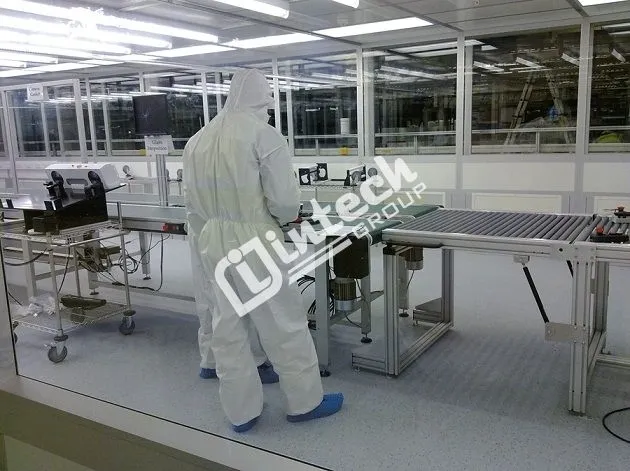As modern manufacturing and research industries are changing, the establishment of distinct production areas such as cleanrooms is becoming more necessary and common. The increasing reliance on cleanroom systems by industries such as pharmaceutical research, food and beverage manufacturing, electronics manufacturing, etc. has increased the need for cleanroom technology automation such as conveyor systems.
Overview of cleanroom conveyors
Modern cleanroom conveyors have many similarities with other conveyor systems, focusing on flexibility, energy efficiency, allowing for easy configuration of production processes. Depending on the specific needs and cleanroom standards of a given application, conveyors are designed and installed accordingly.
When deciding on and installing a conveyor system for an industrial cleanroom, there are several important considerations to take into account. Two of the most important are flexibility and cleanroom classification.
Versatility in cleanroom conveyor systems means a system that is capable of handling multiple tasks and can be easily reconfigured to meet new production needs. When selecting a conveyor for any cleanroom process, it is important to get a system that is suitable for the cleanroom classification rating that is required to meet the stringent requirements of that cleanroom environment. Learn more about how to choose the right conveyor.

Important Considerations for Cleanroom Conveyors
Selecting and installing cleanroom conveyors can significantly improve your productivity. Therefore, understanding your needs and recognizing the attributes of the conveyor system you are considering is imperative. When analyzing cleanroom conveyors, you should consider initial cost, maintenance requirements, noise levels, energy consumption, flexibility, and cleanroom classification.
- Initial Cost:
The initial cost of a conveyor can be indicated by the cleanroom classification rating received for the conveyor system. Find a conveyor that is standard and meets your cleanroom environment needs with little or no additional conveyor cost.
- Flexibility:
In industries where production can change dramatically, a conveyor that is flexible allows manufacturers to use quick and proactive methods to meet new development and production changes. The ideal conveyor will offer the flexibility to easily change the length or curvature configuration.
- Cleanroom Classification:
The most important requirement for a conveyor in a cleanroom environment is, of course, its cleanroom classification. The scope of your cleanroom requirements should be considered when purchasing a conveyor.
- Noise Level:
Noise can be a contaminant in a cleanroom. No conveyor can run in complete silence. With all the moving and working parts that most conveyor processes involve, noise is inevitable. However, the noise level generated by the conveyor needs to be limited and appropriate.
- Maintenance:
Cleanroom conveyors need regular maintenance, maintenance needs to be easy to perform to help keep the cleanroom clean.
- Energy consumption:
Look for a conveyor supplier that uses the most energy efficient motors based on each conveyor application. Reducing KW usage not only saves money but also reduces the carbon footprint of electricity generation. For your cleanroom, consider motors that meet cleanroom standards.
Taking the time to choose the right conveyor for your cleanroom conveyance offers many advantages to your manufacturing operations. Look for a supplier that offers cleanroom conveyors that provide conveyor flexibility and reduce total cost of ownership with standard conveyor prices.





